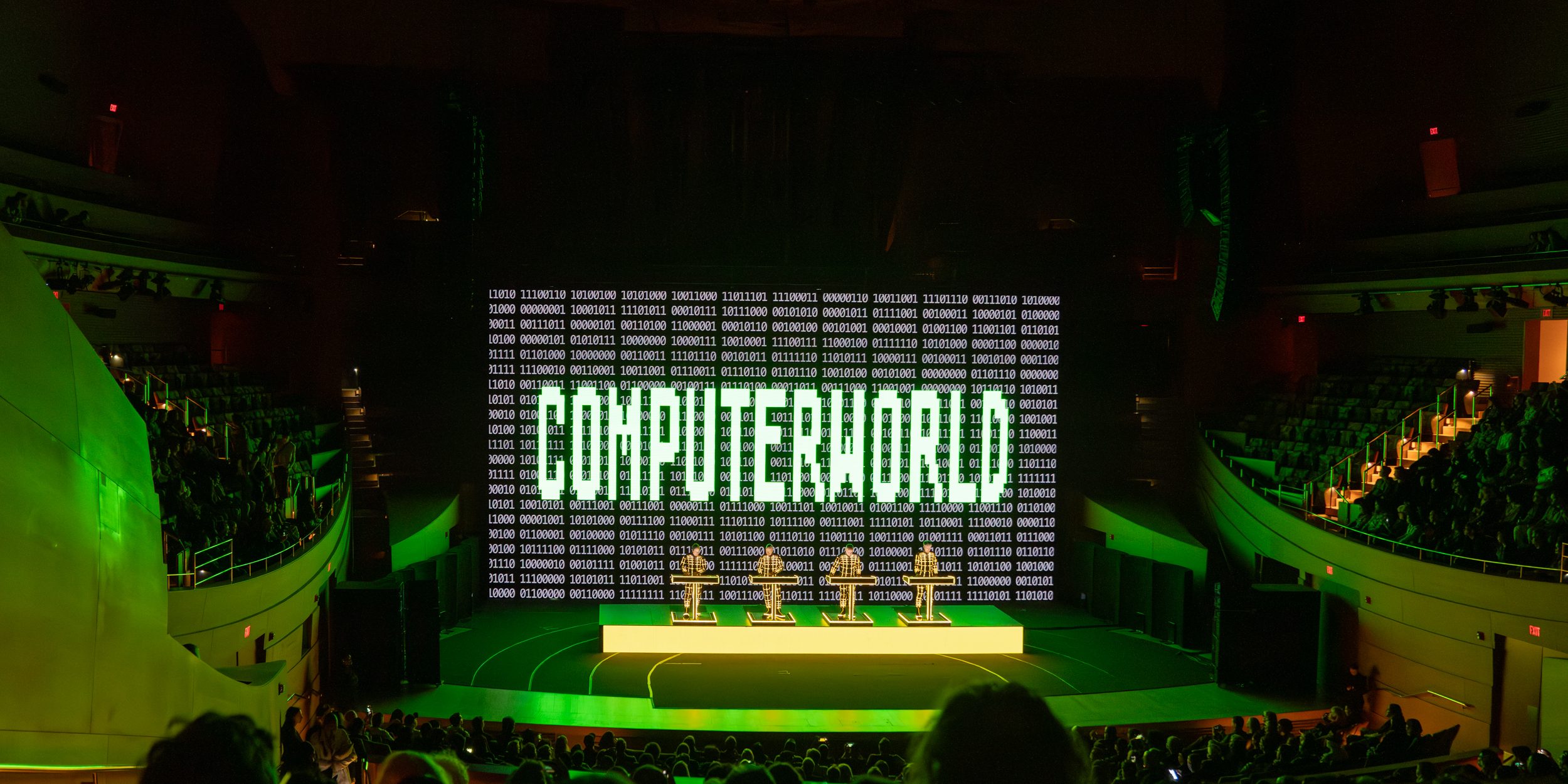In January, Kraftwerk announced a nine night residency at the Los Angeles Philharmonic, housed inside Frank Gehry’s iconic Walt Disney Concert Hall. A perfect venue, as the innovative and stainless steel architectural marvel suits the futurist sounds of the elusive and legendary German band. Just as Gehry is known for his postmodern reformation of industrial materials, Kraftwerk capture and redefine the post-industrial age with their genre defying electronic music. Though such a residency is always a notable occasion, this one in particular celebrates the 50th anniversary of Autobahn, Kraftwerk’s global breakthrough which paved the way for disco, new wave, and dance music as a whole for the ensuing decades. It was a spectacular retrospective with eccentric and immersive visuals to drive the narratives and themes of each song. On each night, the band’s performance centered around a different album from their discography. On May 25, Ethan Kung and Zain Aslam saw Kraftwerk play their seminal 1981 masterpiece Computer World—along with a generous assortment of hits from their decades-long canon. Below is a transcript that recollects their night, memories of the band, and Kraftwerk’s legacy. The conversation has been edited for clarity.
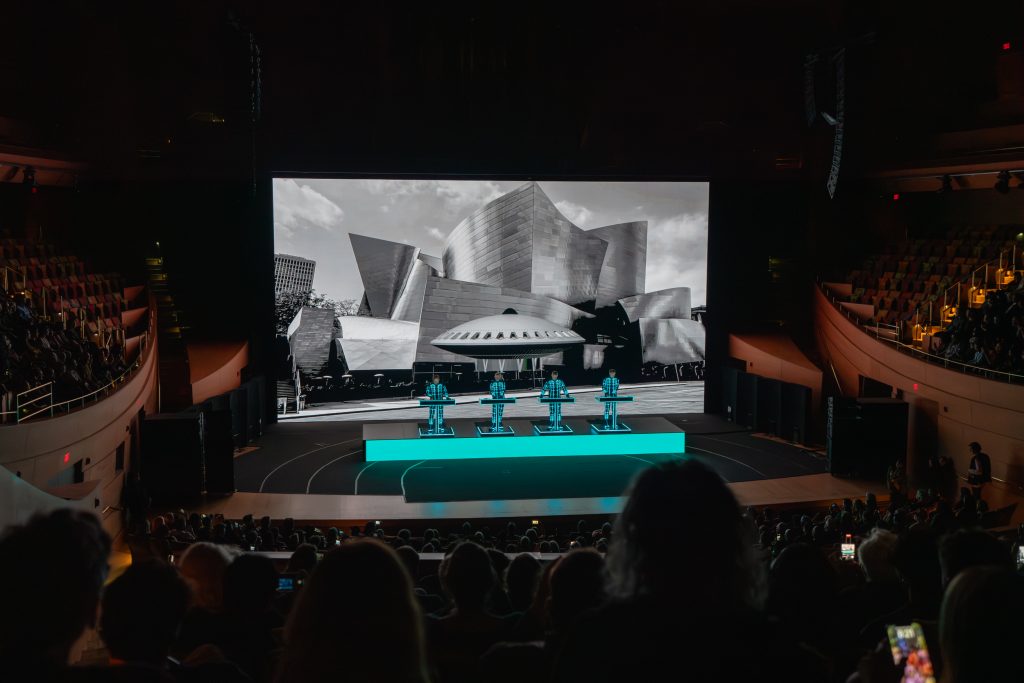
Ethan Kung: Alright, I think we should start with the GPS story.
Zain Aslam: Yeah! So the GPS was a moment that Kraftwerk almost… predicted? I mean, I don’t want to sound like I knew what I was doing, but I knew which way to go. I was like, “Okay, I know I need to get on the 405 and the 10, and I knew things would get a bit messy downtown.” So we decided to use a GPS, which had us go south around Ladera Heights. Which, when you’re trying to get to downtown from UCLA, isn’t the most direct route!
Ethan: I was looking at what my Apple Maps was telling me to do, and I was thinking, “this looks off”. Eventually, I checked where I was sending us to, and realized that I had typed in “LA Phil”. Which is technically where we were going, because the Walt Disney Concert Hall does brand itself with LA Phil…
Zain: Yeah. It’s really their fault, actually!
Ethan: Yep, it’s Apple Maps’ fault – not mine at all! But anyways, it was sending us to whatever building is labeled as “LA Phil” on Apple Maps – presumably their business address or something. Which is definitely not the Walt Disney Concert Hall, where Kraftwerk were going to play!
Zain: Kraftwerk always warns us about how humans are perhaps too influenced by machines. Especially the album that was the theme for the night, which was Computer World. And that’s essentially what happened to us!
The machine didn’t understand that we were going to a concert, it just knew that like, “you’re going to this nondescript place called the LA Phil”. Like LA Phil is short for LA Philharmonic, which is at the Walt Disney Concert Hall. Computers, y’know. No matter what people say – not as smart as you think.
Ethan: No, definitely not! But hey, we ended up making it on time anyways.
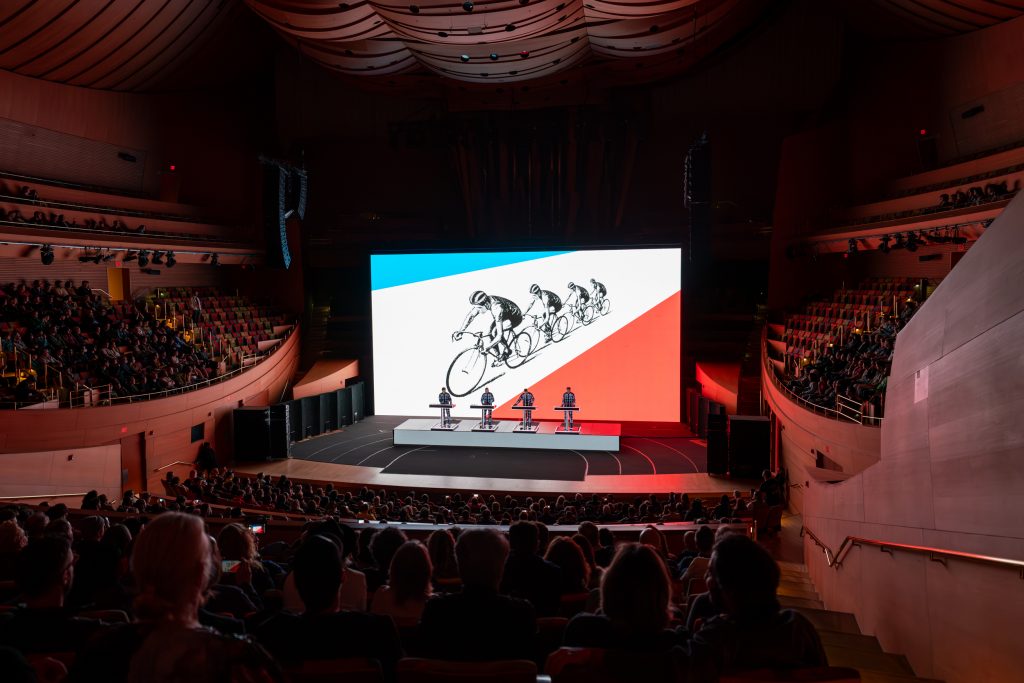
Zain: I think having Kraftwerk at the Walt Disney Concert Hall is kind of a big deal. Because they don’t really do live shows much anymore. So it’s always a special occasion. And this was a residency a little over a week long. They played all of their albums live, although they didn’t really play the original album versions of their songs. Even for songs from Computer World, they played redone versions that they had released in an anthology. So that was cool. I actually never listened to that compilation before. So it was really cool listening to the newer versions of songs like “Computer Love”, for instance.
Ethan: Yeah, I feel like these new versions really come to life in the live setting. I’ve heard a lot of good things about their performances, but their music… could be interpreted by some as… a little bit goofy! It’s obviously tapped into the ubiquitous sci-fi sound, and that’s tied into what we think of as campy or maybe a little cheesy. But their music goes insanely hard live.
Zain: I think the one thing I didn’t expect from the live performances was how, I don’t know if I’d call it improvisation, but they would kind of riff on a certain motif at length. So “Tour de France”, as a single, is maybe seven minutes long. But the live version is like, twice as long and they brought in other songs to incorporate. Like the way on “Trans-Europe Express”, they brought in “Metal on Metal”. They would make these live medleys, which were really cool, and as far as live experiences go, is pretty great.
But the funny thing about them being live is that they’re obviously not like rock musicians. So they’re very, like, stationary as performers. But then they more than make up for it with those cool outfits, and the screen, and the lights…
Ethan: Yeah, the whole stage setup was incredible, even from our perspective, which was in the side orchestra area. It was mind boggling and eye destroying. The visuals were just so loud, like the music was. I’m sure that it’s taken their entire career to perfect this audio-visual experience, and it’s incredible. It’s more than I could have imagined!
Zain: It really drives how seeing them live is a very cinematic experience, and it’s like purposefully cinematic with the screen and the animations, the lights and the sort. I went back and I listened to their albums over, and it clicked to me how cinematic their sound is, and their whole approach to music is creating this very immersive experience. So I feel like watching them live, I understood an element of their music that didn’t really click for me before. Before it was just like electronic music, but I’m just like, “Oh no, this is poetry, it’s like lyrical poetry or this is like a good work of fiction”. You’re genuinely immersed in it. I don’t want to say necessarily that some songs have their stories but like, you know, certain songs are just like, trying to capture the experience of riding your bike around with your friends! Or riding a train across Europe!
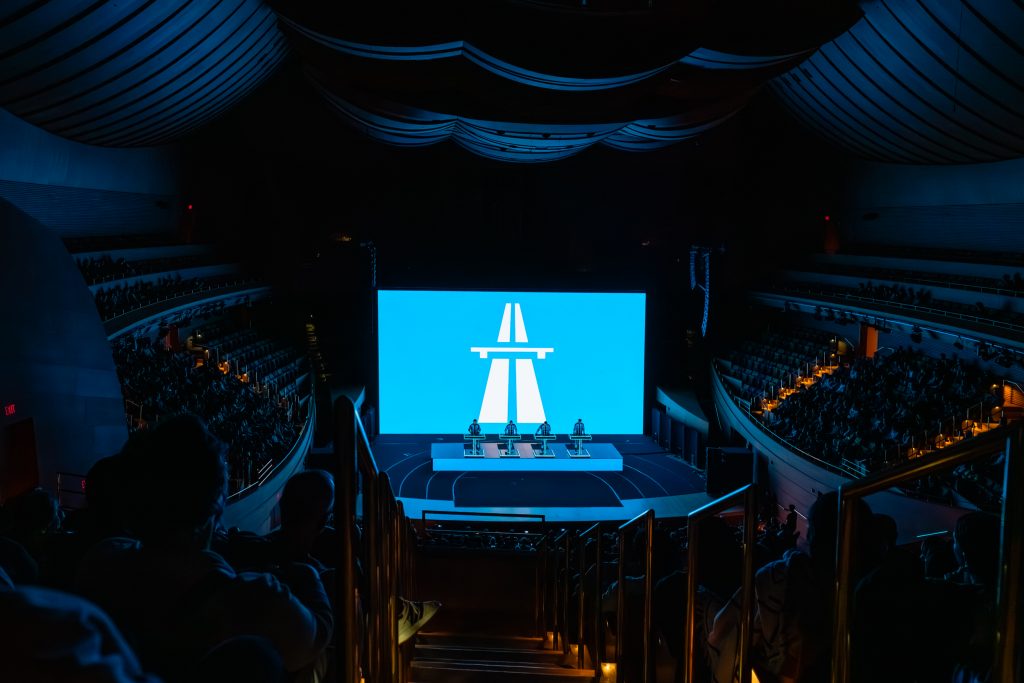
Ethan: A great example of that was “Autobahn”, which is a classic. Just hearing it live is so surreal – it legitimately didn’t feel real hearing it performed live. Like… that song is 50 years old this year. It’s older than a lot of people are! And that song was probably the best example of a cinematic experience with its visuals. There’s this Volkswagen driving around, and it’s got some kind of enemy in a Mercedes Benz that it’s racing around. Not that the sounds of them making car honking and tire screeching noises wasn’t already immersive, but those visuals really added a lot. And something I found really odd about it that’s changed my interpretation of “Autobahn” whenever I listen to it now is the ending of the visuals. The little Beetle takes an exit off the highway towards the edge of a cliff, passing a sign that says that the highway is ending. Then it fades to black! It’s a very ominous ending that’s changed my interpretation of that song!
Zain: For sure. That was kind of funny. Definitely, like a super dark ending. I genuinely don’t know how to interpret it! Like, is it a joke? They have this very subtle sense of humor. But let’s talk a bit more about the visuals for a second because obviously that was such a big part of the show. But it was kind of funny because the visuals were really, really, really well done. But they were also very archaic.
Ethan: Yeah. Like the visuals on “Autobahn” were very primitive, they looked like an early PlayStation game, but at the same time, it looks like what the song sounds like! It would be disingenuous to have super state of the art CGI for “Autobahn”. “Numbers”, the intro track, was also really amazing. I’m not even sure how to describe it in words, but the counting of the robotic voice on that song, and the screen showing this psychedelic wall of infinite numbers was really a crazy way to start the show!
Zain: Yeah. Were there any tracks or series of tracks that really… I don’t want to say impressed you, because I’m sure everything impressed you. But just helped you feel like you learned something new about Kraftwerk after the show?
Ethan: Absolutely. For me the song that clicked the most live was “The Man-Machine”. I never liked that song much until I heard it live. It’s just an absolute beast live. The drums, the clicking noises, and the industrial sounds on the studio version sound fine. But live they sound enormous – larger than life, and the beat just hits you in the heart. Same with “Radioactivity”, which also turns into a monster in the live setting. The meaning also became completely different.
Zain: It becomes like a protest song!
Ethan: Yeah, a protest song about nuclear energy. It’s got much more fire in its heart than the original, which is a much more creepy song. But what about you – what else impressed you?
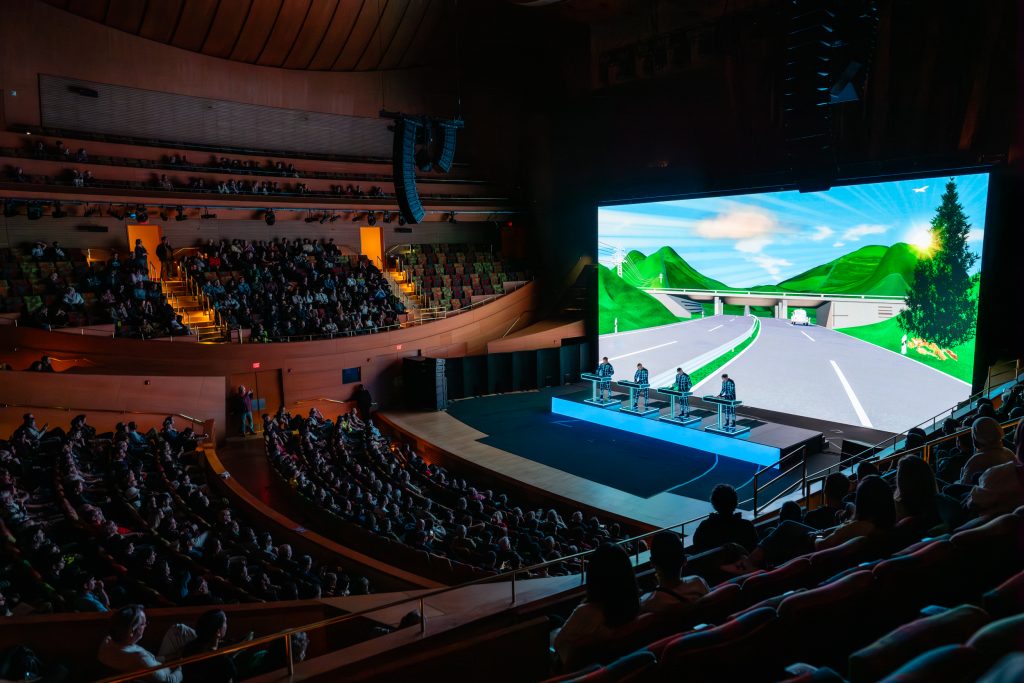
Zain: For me it was towards the later end of the show when they started playing their later stuff, which, to be honest with you, I hadn’t paid that much attention to. I felt like I listened to the very canonical Kraftwerk albums, and that canon really ends at Computer World. So I think that listening to stuff like “Electric Cafe”, “Techno Pop”, “Music Non Stop”, “Planet of Visions”, “Boing Boom Tschak”… that was really cool. Because the Kraftwerk that I knew before the show was like “okay, these are very cool, very sophisticated, conceptual musicians that are in a world isolated outside of rock’n’roll music and dance”.
But I think those later songs kind of showed how they’re not actually isolated at all. They’re very much a part of the scene, very much into the scene, influenced by the scene. Absorbing the developments from house music and new-wave type disco – the music they influenced, they’re taking in influence from that as well. I think that was just really really, really impressive. And those are kind of the tracks where, like I said, I learned something new about Kraftwerk, like, I didn’t realize they could make polished pop. Like, it’s kind of weird to call them pop songs, because they’re still very arty and kind of avant garde, but it’s their versions of pop songs or their version of dance tunes.
Ethan: That’s a really good way of putting it. “The Model” was a highlight of the show, and that’s a very poppy song that feels like the blueprint for what we interpret as synthpop today. That amazing hook made the crowd go crazy, and the choruses are just so addictive. But you can take that to the flip side with a song like “Planet of Visions”, which is in a techno, acid house style. It’s crazy – those genres wouldn’t have existed if Kraftwerk didn’t make “Autobahn”. But they also have their own takes on this thing that they indirectly helped invent. So the breadth of their discography was really on display in the setlist.
Zain: Right. It also showcased how Kraftwerk aren’t very snobby musicians. I think a lot of people might interpret them that way, because they’re a bit aloof. They don’t do interviews. They’re very conceptual, they’re very European. German! I don’t know, there’s a lot of assumptions you could make about them. But really, they’re very generous musicians and they’re not snobby at all. They’re like, “oh, you could do this with electronic music, we didn’t think of that, let’s try it!” They’re not like “oh, we’re better than this”. “Let’s keep trying to capture the way the train sounds or something of this sort.”
Ethan: That was also something that I figured out over the show – I realized that they’ve got a very dry sense of humor. I think their music is meant to be at least a little bit funny, a little bit charming. Just listen to a song like “Pocket Calculator” and try not to have a smile on your face!
Zain: Yeah, I think it’s funny because I don’t think that there’s a picture of them smiling, or goofing off, or anything of the sort. But there’s definitely a lightness to their music. Like I said, I guess “Radioactivity”, especially the live version, is very political. But they’re not, they’re not usually heavy handed musicians. They’re not heavy handed musicians, and Computer World has warnings about technocracy and stuff of the sort. But there’s songs on there like “Pocket Calculator” and “Computer Love”, which is like a really charming song. It’s a bit haunting, because it’s about isolation and trying to find connection, not through human-to-human contact, but through human-to-technology contact. But they’re not trying to tell you how to feel about these things. It’s almost like they’re very light-hearted observers.
Ethan: Computer World, as much as it’s looking at technology through a suspicious or wary lens, I think it’s also looking at it in an innocent lens. Like “Home Computer”, or “It’s More Fun to Compute” are pretty pure expressions of like, “oh, computers are cool! Look at what we could do with them!” They’re very innocent and fun.
But then, as you said, there’s “Computer Love”, which is just amazing. That song’s got a bittersweet feeling to it – it makes me think about how that song was made in the early 80’s. They couldn’t have known about dating apps. They couldn’t have known about weird AI chat bots. They couldn’t have known about any of that! But those are all things that people talk about quite a lot these days. “Computer Love” is a really interesting commentary, forward thinking commentary on technology.
Zain: It’s very exploratory.
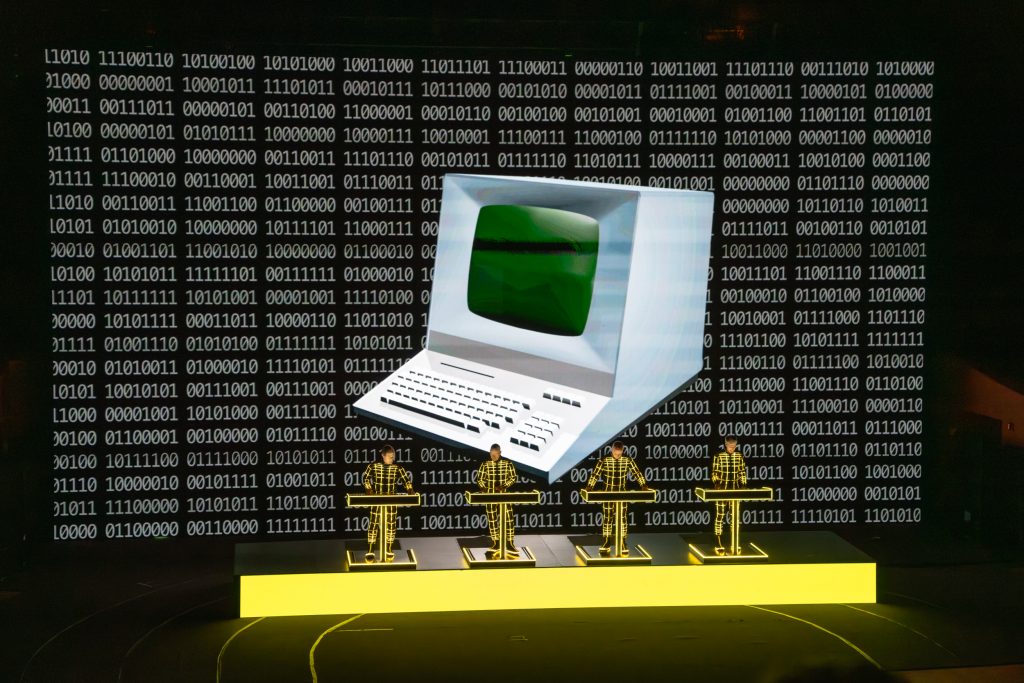
Ethan: It’s also just kind of a banger, the live version of “Computer Love”!
Zain: My god, yeah! 100%.
Ethan: It’s a very danceable song. It feels a little more happy than the original version, which is a bit somber.
Zain: It’s a bit unusual. “Computer Love” is also very unusual for a Kraftwerk song because it’s not sonically very conceptual, but it’s lyrically very conceptual. Of course, the lyrics move the song, which is very unusual for Kraftwerk, because they’re all about different sound patterns and stuff. And the listener recognizes like, “oh, this sounds like a person breathing or like, oh, this sounds like someone typing, or this sounds like a buzz from a light.” But the music is, almost like, structurally, you know, a very straightforward pop song and the lyrics are carrying the message. So as far as Kraftwerk songs go, it’s very unique.
Ethan: Definitely. You know, I feel like we should really talk about the crowd. Because this was one of the most interesting crowds I’ve personally seen at a show.
Zain: Yeah, I think there’s many reasons for that. One part of it, I think, is just the venue. So there were a lot of older people in suits and stuff. And then I think you’ve talked about the wide range of people Kraftwerk attracts.
Ethan: I was joking with you before the show, saying “I’m probably going to be the youngest person in this crowd by some decent margin”. I’m happy to say that I was wrong, because we saw this incredibly diverse range of races, ages, everything. I saw this group of Asian teenagers who must have been about my age, wearing torn jeans, baggy t-shirts, and jewelry. And that’s what a Kraftwerk fan can look like, just as much as a really old rich dude who wants to sit at the Walt Disney Concert Hall on a Saturday. Those are both equally possible Kraftwerk fans, and that’s super fascinating to me. Kraftwerk has an inherently boundary-less nature – anyone can enjoy listening to a robot! They’re not tied to any race, gender, or other identity.
Zain: The other thing about the crowd at the show was definitely the diversity of how people enjoyed Kraftwerk. Yeah, most of the crowd was sitting very respectfully. But there were, I would say, maybe half-a-dozen people who were fist bumping and dancing. Just the ways that people even listen to Kraftwerk. Like I’d never thought of Kraftwerk as being music you could fist pump to, but there was a guy a couple of seats over who – it was like he was out at the club!
Ethan: Yeah, he was going crazy, it was so much fun to see! I’ll probably never see a show that diverse in every way again. It’s definitely a testament to Kraftwerk’s universal appeal.
Zain: I think that was also on display that night from the type of people who enjoy Kraftwerk, but also somewhat evident in just looking at the types of bands and music that Kraftwerk has influenced.
Ethan: True! You think about something like “Planet Rock”, one of the earliest hip hop classics from the early 80s. Then think about Depeche Mode and New Order – all the new-wave bands. Then think about Coldplay sampling “Computer Love”! Even today, bands still sound a bit like Kraftwerk, taking the same approach to making melodies. It’s probably why people can still get into Kraftwerk – their DNA is in so much music.
Zain: It’s really funny, because they were never a popular band, in the sense that they never did arena shows, and the sort. I like reading and writing a lot, and there are writers who sell a lot – then there are writers who are considered writer’s writers. They’re really well known because they’re read by people who enjoy writing as an obsession. And I feel like Kraftwerk is a musician’s musician/musician’s band. Because their influence was immediate as a musician’s band.
The people who made music and were innovating music at the time were all aware of Kraftwerk, and were immediately influenced by them. They came about in the early 1970s, and by 1974, Bowie was referencing Kraftwerk in his albums, and in the late 70s Afrika Bambaataa referencing Kraftwerk, Giorgio Moroder referencing Kraftwerk. All of these guys were taking Kraftwerk in.
Ethan: Yeah, that’s why this show felt really special. Computer World, as we talked about, feels like a particularly powerful album right now, and its influence is definitely felt.
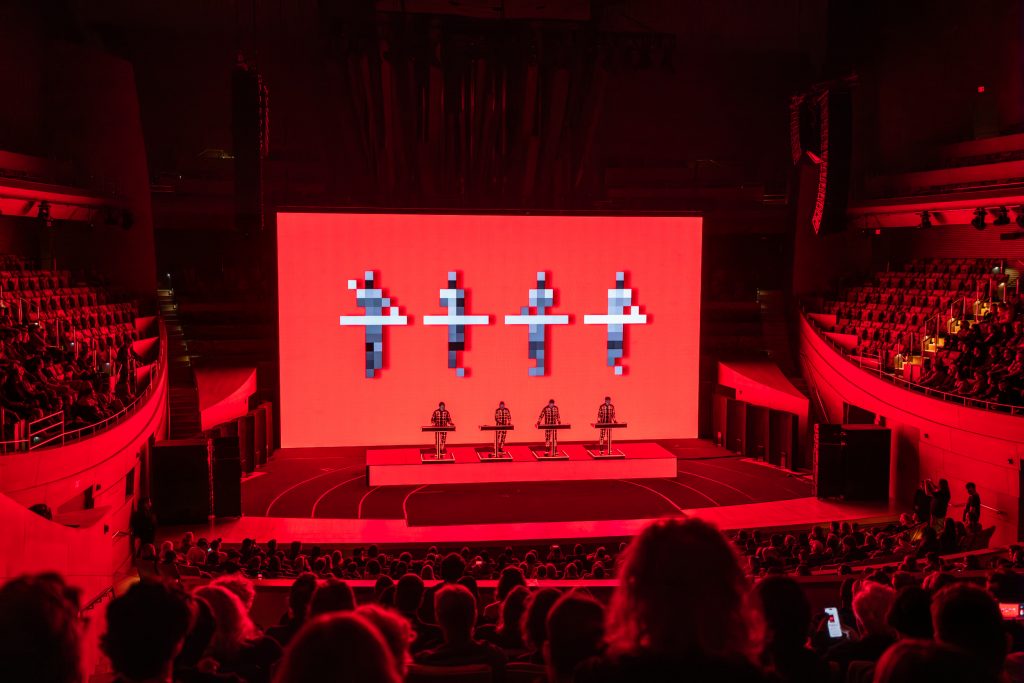
Zain: After the show, you also told me that when the band members were bowing out, you kind of realized that you were in the presence of legends, right?
Ethan: Yes!
Zain: Like, “oh my god, I can’t believe we just saw these guys who have been making revolutionary music for 50+ years!” We saw them live, in-person! They’re not very public people, either, so that connection felt special. Ralf Hütter, who was the last member to bow out, we were looking at like, “oh my god, that is the closest that fans can get to Ralf Hütter!” And also thinking about how Florian Schneider passed away a few years ago… this isn’t something that’s going to last a very long time. So seeing them live, right now, was especially great. And it wasn’t like watching – and this is no disrespect to the Rolling Stones – but it felt very authentic. Because how they performed that night was basically how they’ve been performing for the last 50 years. So you feel like you’re looking at history!
Ethan: It was definitely a bit emotional seeing Ralf Hütter getting off the stage last, and the whole crowd giving him a massive standing ovation. I was talking to my dad earlier today, and he was telling me about how people keep listening to the music they listen to in college even when they’re really old. And that got me thinking about how when I’m in my 70s, that being in about 50 years, Autobahn will be 100 years old!
Zain: You’re right! *laughs*
Ethan: And it just blows my mind that I’m here, right now, living in a time where Kraftwerk isn’t history. They’re here. They’re performing. And they’re doing a really good job of it! That makes me really happy.

